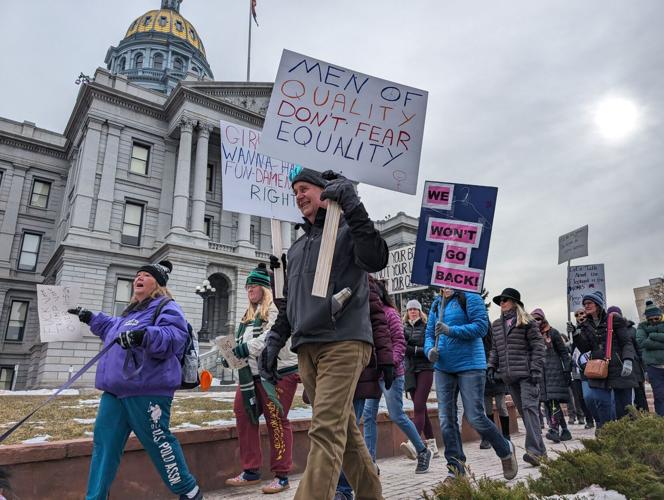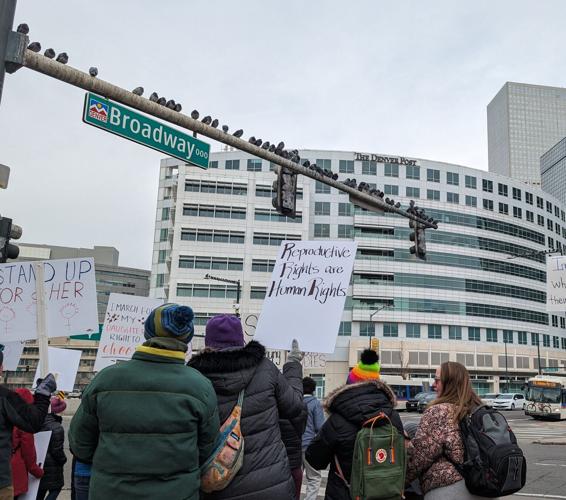Abortion rights advocates attend Women’s March in Denver
Scores of abortion-rights supporters stood outside of the Colorado state Capitol building on Saturday morning with picket signs and then marched down Denver’s 16th Street Mall almost two years after the U.S. Supreme Court overturned federal legal protections for abortion.
Other Women’s March events kicked off in multiple cities across the country, including Tampa, Washington D.C. and Phoenix.
Across the ideological aisle, anti-abortion activists plan to hold their own “March for Life” rally at the state Capitol in April.
“A lot of women are struggling across the country and we just want to make sure that they are all heard. We are standing up for them,” Kelsey Hauge, co-host of Saturday’s march said. “We want a constitutional right, maybe a new amendment, for full-body autonomy for all human beings in the United States.”
Hauge and her sister, Kayla, said they decided to host the Denver march when they learned no local event was scheduled in coordination with the main Women’s March in Arizona. Kayla traveled from Fort Collins and Kelsey from Sidney, Nebraska.
“We are just excited to be able to share our voices as women,” Kayla said. “We should be able to show our First Amendment right and march for the things you believe, regardless of if you are in a red or blue state. It’s all about being heard and being seen.”
The marchers chanted, “My body, my choice” and “Women’s rights under attack. What do we do? Stand up, fight back.”
Organizers said this year’s march — tied to the 51st anniversary of the decision of Roe V. Wade on Jan. 22, 1973 — was designed to “build momentum and galvanize voters to take action and build power ahead of the 2024 general election … focusing on the nine states where abortion rights will be directly on the ballot as their own abortion access referendums.”
The abortion rights march on Saturday and the opposing “March for Life” rally in April serve as a preview to the electoral fight that’s taking shape in Colorado and across America, where Democrats expect to push abortion rights, a winning issue for the party, to the front of voters’ consciousness.
In 2022, Colorado’s policymakers enshrined abortion as a fundamental right under the Reproductive Health Equity Act. Among the most permissive in the country, the law affirmed in state law the right to choose an abortion or carry a pregnancy to term. Fertilized eggs, embryos and fetuses do not have independent rights under the law, and it prohibits state and local public entities from denying or restricting a person’s right to use or refuse contraception, or to either continue a pregnancy or have an abortion.
In 2023, Democrats approved three bills aimed at shielding abortion patients and providers from interstate investigations, expanding insurance coverage for abortion care and banning what sponsors called “deceptive” advertising and the use of abortion “reversal” pills in crisis pregnancy centers.
“When it comes to abortion rights, Colorado has always been a national leader,” Rep. Lorena Garcia, a Democrat from Adams County, said in a Friday press release, adding Colorado “abortion bans disproportionately impact people of color, and enshrining abortion into the Colorado state constitution further protects our fundamental right to an abortion.”
“That’s why we live here,” said Linda Gonzalez, who joined the march. “We believe we are in a state that believes in the things we believe in and protects our rights. It’s not that way across the country. We have to get out so we can get the rest of the country up to speed.”
“The idea is to make it seen that even though we have our rights here, we are not stopping. We’re going to help those in the red states that are struggling right now. We are letting them know they are supported,” Kelsey Hauge said.
During a Senate debate on abortion bills last year, anti-abortion advocates argued that that proposals would potentially make Colorado a hub of interstate abortion access.
“We are signaling to the rest of the union and the rest of the world that … Colorado will proudly end the life of any unborn child at any time during pregnancy,” Sen. Kevin Van Winkle, R-Highlands Ranch, said at the time. “It seems to invite anyone wanting an abortion to come to our state to end the life of a child.
“It is wrong. It promotes a culture of death,” he said.
Abortion procedures and expenses have increased in Colorado since the court’s decision, which removed the longstanding federal framework that governed the parameters of abortion and instead gave the states the ability to define the contours of their abortion statutes.
In 2021, when Roe was still in place, the Cobalt Abortion Fund said it provided some $207,000 in support in Colorado, mostly to help women cover the cost of abortions. Some $6,000 went toward practical support, such as travel costs for women to reach abortion services in Colorado.
By December 2023, Cobalt reported providing $874,433 in support, with $333,264 of that going toward travel and transportation costs.
A Dec. 7, 2023 analysis from the Guttmacher Institute found one in five pregnant people who had an abortion in the first half of 2023 traveled out of state for the operation.
Colorado Department of Public Health and Environment reported that the state performed 14,154 abortions in 2022, the most in the state since 1985. About two in seven were performed on out-of-state patients.
“The latest CDPHE abortion numbers show the heartbreaking consequences of Colorado’s radical pro-abortion legislative agenda of the last few years,” Marcie Little, Colorado for Life co-founder and executive director, wrote regarding the 2022 data.
“It should horrify Coloradans to know that while other states have acted to save innocent unborn lives, we’ve become THE destination for abortion not just in the United States but around the world,” Little said.
To Marie Wagner, who marched on Saturday, the safe haven created by Colorado is not a detriment, but a reason to come out and show support for the state and those nearby.
“Our health providers here are inundated with folks from Wyoming, Arizona and every place else,” she said. “Even if you are lucky enough to be in a state like Colorado, it’s still impacting you. It’s impacting our healthcare system. The dollars aren’t the biggest issue, but it’s costing us, too.”
Rep. Meg Froelich, D-Englewood, said that the interstate abortion protection was demanded by Coloradans.
“Coloradans counted on us to expand abortion access, protect those seeking care from out of state, and defeat anti-abortion legislation in the State House,” she said in a Friday press release. “We must continue this fight to ensure our fundamental reproductive freedoms are protected for generations to come by enshrining the right to an abortion into the Colorado state constitution.”
The Denver Gazette’s news partner, 9News, contributed to this report






